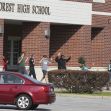In a unanimous decision by the 11th US Circuit Court of Appeals in Atlanta, justices rejected a lawsuit filed by fifteen survivors of the Marjory Stoneman Douglas High School shooting. The survivors sued local officials for not protecting them during the mass shooting that claimed the lives of seventeen victims and traumatized many others at the Parkland, Florida, school in 2014.
The ruling by a three-judge panel dismissed the lawsuit by the plaintiffs, upholding a prior, denied appeal. The students had filed the lawsuit against Broward County public officials and former Sheriff Scott Israel, Superintendent Robert Runcie, former school resource officer Scot Peterson, and former school security monitor Andrew Medina.
Students from the Marjory Stoneman Douglas High School sued the public officials claiming “their response to the school shooting was so incompetent that it violated the students' substantive rights under the Due Process Clause of the Fourteenth Amendment to the Constitution.”
The mass shooting on Valentine's Day, 2014, by Nikolas Cruz resulted in the violent deaths of seventeen students at the high school located in Parkland, Florida. Seventeen others were injured during his six-minute attack. Cruz’s case is currently awaiting trial but has been put on hold due to the pandemic.
In court papers, the plaintiffs allege the “Parkland tragedy was exacerbated by government blunders before and during the shooting. The Broward County Sheriff’s Office failed to act on the “many dozens of calls” it received that warned of Cruz’s dangerous propensities.”
Before the tragic shooting, both the Broward County Sheriff’s Office and Superintendent of Schools Robert Runcie were warned Cruz could be dangerous after they received “many dozens of calls." However, officials did not increase security in any way before the massacre.
The plaintiffs also charge the school security police officer “permitted him to enter the school anyway. Medina radioed and texted other security officials that Cruz—a suspicious person—was present, and he drove a golf cart toward Cruz. But he did not directly approach Cruz or call in a code to put the school on lockdown. Medina later explained that he was ordered not to call in a code unless he saw a gun, so he did not call one in even after he heard gunshots.”
After letting the killer enter the school, despite hearing gunshots about a minute after allowing entry to him, Peterson and others stayed outside with guns drawn, not entering the building to help the students. The plaintiffs argued these actions were “not only incompetent but unconstitutional.”
In denying the former students' claims, the justices discussed reasons for their dismissal of the lawsuit. The titles of these paragraphs explaining the decision include, “The students failed to state a substantive-due-process claim,” “The students were not in a custodial relationship with the defendants,” “The students do not allege any “Arbitrary” or “Conscience Shocking” conduct,” and “The students failed to state a Failure-to-Train claim.”
In the US, school shootings have become common, and the National School Safety Center reports that since March 2002, there has been a shooting every year in March. March 2020 was the first March in two decades where there were no school shootings in the US. Experts believe this is because most schools were closed due to the pandemic.
Since Columbine in 1999, there have been 229 US school shootings with 304 people killed during the attacks.






